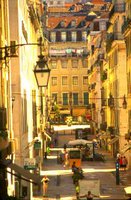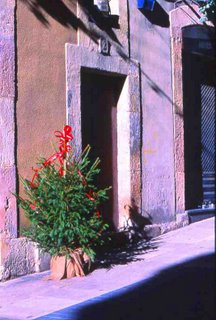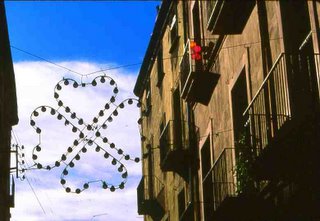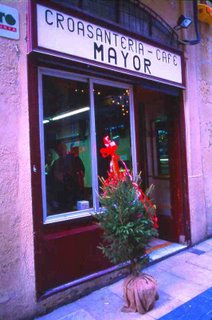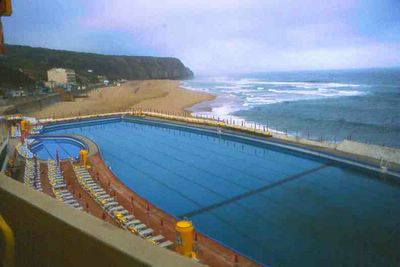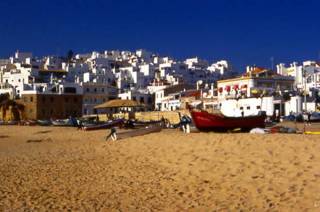 Longtime readers, you've seen this one before.
Longtime readers, you've seen this one before.This time of year, some folks retell Dickens's A Christmas Carol or Moore's "T'was The Night Before Christmas." I retell the Jose Feliciano airport story.
And so, apparently, do my kids. Adam was in the dentist's chair yesterday when Jose's signature holiday tune came on. While the doc arranged instruments and measured out novocaine, Adam told her our Jose story. I love that he shared the story, but I also secretly imagined her being extra careful on his teeth because she was handling someone who'd met a famous person.
Jose, if Adam's filling holds for the rest of his life, we have dental medicine and you to thank.
Enjoy, and feliz Navidad:
We were at the airport in Lisbon waiting to board our plane home from a Christmas-week family trip to Albufeira, a seafront town in the Algarve. The gate area was packed with travelers, and all seats were taken. Dana was two, Adam five, both seasoned travel vets. They sat in the plastic chairs we'd managed to snag, swinging their legs and sipping juice.
A group of tall men milled around, looking for a seat for a smaller, blind companion. Mike offered his chair, and the blind man sat down next to me.
We'd overheard the men, musicians, talking about the bad flights and lousy hotels they'd endured on their current tour. I leaned over and asked the quiet, blind man, "What kind of music do you play?" All the men looked worn and tired, a littled rumpled and disheveled. I figured they played low to middle-tier clubs and bars. The Zildjian cymbals they kept at closer than arm's length were the only hint of the possibility of something bigger.
"All kinds," he said. "Maybe you've heard me on the radio at this time of year singing a song I wrote..."
"!You're Jose Feliciano!?!" I launched into "Feliz Navidad" and called Adam over between notes. "Adam! This man wrote the Christmas song that mommy sings all the time!" I sang some more. Adam joined me on the "prospero ano y felicidad" and let loose on the "I wanna wish you a Merry Christmas." Jose was pleased.
We talked with Jose for a half hour. His big, serious, but very gracious manager hovered protectively. The band was on its way home from a sold-out New Year's Eve concert in Estoril, and Jose was eager to get home to Connecticut to his pregnant wife and two young children. A loving, involved dad, he talked about his kids. "I try not to spoil them," he said.
Although he couldn't see them, Jose was keenly aware of Adam and Dana. He sensed their movements. He used their names when he spoke to them. He told Adam to "enjoy being a kid, because it goes by so fast." He told Adam jokes: "Adam, why did the turtle cross the road? He wanted to get to a Shell station." And, "Why did the chicken cross the road, Adam? To get away from Colonel Sanders." Dana was cranky, and Jose gve me parenting tips: "Change her diaper before you get on the plane, and give her a lot to drink so her ears won't hurt from the change in cabin pressure."
We boarded. Jose crossed the Atlantic in first class, and we sat in steerage, narrowly escaping the flood of red wine that burst from the overhead bin when a Portuguese woman's straw-bound jug of homemade vinho de mesa popped its cork. A nearly eight-hour flight. Adam and Dana handled the marathon transit like pros. They played with Legos, colored, ate stuff, and scanned the headset stations. Henry the Navigator would have been proud of their endurance.
When we landed in Newark, I noticed Jose sitting alone on a windowsill in a corner, waiting for his men to pull the luggage from the carousel. I told Adam he could go over and say good-bye.
Thousands of miles, eight hours, two movies, two meals and one ocean had passed since we'd shared polite conversation with Jose Feliciano back in Lisbon, which seemed a lifetime away. As Adam walked toward the tired man, I realized Jose might not remember Adam. And Adam didn't know Jose was blind. We hadn't mentioned it, and Jose wasn't wearing dark glasses. Jose wouldn't see Adam coming. He wouldn't see Adam at all. He might not be able to put a name to this little person he'd never seen, only heard. Adam was a voice from another time zone, another continent, another reality. Would Adam's five-year-old feelings be hurt? Should I have left well enough alone?
I stood nearby and listened. "Bye, Jose," whispered Adam.
Jose looked up and smiled. "Take care, Adam."











 principle boardwalk in the still-dark. Wearing dark dresses and aprons and headscarves and well-worn sandals, and armed with pails and hand brooms, they'd exchange a little gossip then get to work tidying up the kingdom.
principle boardwalk in the still-dark. Wearing dark dresses and aprons and headscarves and well-worn sandals, and armed with pails and hand brooms, they'd exchange a little gossip then get to work tidying up the kingdom.




